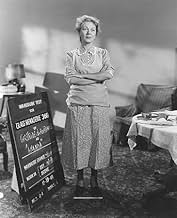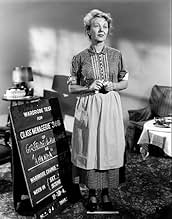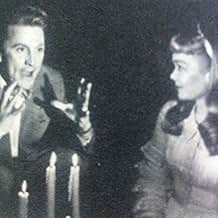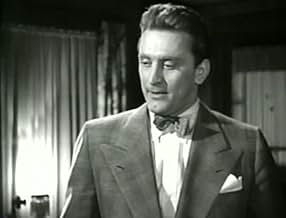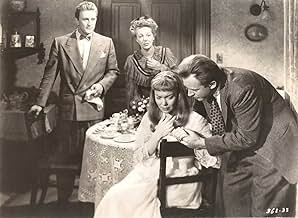IMDb-BEWERTUNG
7,0/10
1329
IHRE BEWERTUNG
Füge eine Handlung in deiner Sprache hinzuMerchant marine officer Tom Wingfield reminisces about his life in St. Louis where he had lived with his nagging mother Amanda and crippled shy sister Laura.Merchant marine officer Tom Wingfield reminisces about his life in St. Louis where he had lived with his nagging mother Amanda and crippled shy sister Laura.Merchant marine officer Tom Wingfield reminisces about his life in St. Louis where he had lived with his nagging mother Amanda and crippled shy sister Laura.
- Auszeichnungen
- 1 wins total
Philip Ahn
- Sailor
- (Nicht genannt)
Chris Alcaide
- Eddie
- (Nicht genannt)
Richard Bartell
- Barman
- (Nicht genannt)
Peter Camlin
- Sailor
- (Nicht genannt)
Perdita Chandler
- Girl in Bar
- (Nicht genannt)
Victor Desny
- Sailor
- (Nicht genannt)
Sarah Edwards
- Mrs. Miller
- (Nicht genannt)
James Horne Jr.
- A Caller
- (Nicht genannt)
Louise Lorimer
- Miss Porter
- (Nicht genannt)
Sean McClory
- Richard
- (Nicht genannt)
Empfohlene Bewertungen
Gertrude Lawrence only made 13 films in her career, but she was beloved for her stage performances in England and on Broadway. The English-born actress does a fantastic job with her southern accent as Amanda Wingfield. She plays the perfect nagging yet doting mother in "The Glass Menagerie."
Jane Wyman plays her daughter, Laura, and Arthur Kennedy is her son, Tom. The cast of this first film of the play is rounded out with Kirk Douglas as Jim O'Connor and Ralph Sanford as Mendoza. With this superb cast, this may be the best film rendition of the Tennessee Williams story on which the film is based.
One drawback is its revised ending that leaves a question in the viewers mind. So, what eventually happened to Amanda and Laura? And, I agree with observations by some that the effort to make Lawrence appear younger is a negative. Especially when she gets dolled up for the dinner evening with their guest, Jim O'Connor.
Lawrence was well liked by audiences as a dramatic and comedy performer. Besides the stage and films, she played nightclubs and sang. She won a Tony for her starring role in the original Broadway production of "The King and I" opposite Yul Brynner.
But, Lawrence made so few films, that there aren't many examples of her acting talent available otherwise. This version of "The Glass Menagerie" may be the best example for movie buffs to see a performance by this fine British star of stage and screen.
Lawrence died at age 52 of cancer. She lived a high life, well beyond her substantial means, and was deeply in debt most of her life.
Here's a favorite line from the film. Jim O'Connor, Ah, when you first meet Mendoza, you don't like him. But, when you get to know him, you hate him."
Jane Wyman plays her daughter, Laura, and Arthur Kennedy is her son, Tom. The cast of this first film of the play is rounded out with Kirk Douglas as Jim O'Connor and Ralph Sanford as Mendoza. With this superb cast, this may be the best film rendition of the Tennessee Williams story on which the film is based.
One drawback is its revised ending that leaves a question in the viewers mind. So, what eventually happened to Amanda and Laura? And, I agree with observations by some that the effort to make Lawrence appear younger is a negative. Especially when she gets dolled up for the dinner evening with their guest, Jim O'Connor.
Lawrence was well liked by audiences as a dramatic and comedy performer. Besides the stage and films, she played nightclubs and sang. She won a Tony for her starring role in the original Broadway production of "The King and I" opposite Yul Brynner.
But, Lawrence made so few films, that there aren't many examples of her acting talent available otherwise. This version of "The Glass Menagerie" may be the best example for movie buffs to see a performance by this fine British star of stage and screen.
Lawrence died at age 52 of cancer. She lived a high life, well beyond her substantial means, and was deeply in debt most of her life.
Here's a favorite line from the film. Jim O'Connor, Ah, when you first meet Mendoza, you don't like him. But, when you get to know him, you hate him."
10peacham
One of the few chances to see the great Gertrude Lawrence on screen. her amanda is so complex,manic,gentele,harsh. a truly great performance that was totally ignored by the academy.arthur kennedy too is compelling as tom. a shame he did not do more William's on screen he was one of the major stage interpreters of the man. only jane wyman seems miscast,a bit too character-actressy for the subtlty of the role to shine through.too bad,because without a good laura half the play is lost. a good effort that could have been great if they had not used wyman.
Having never been a lover of Williams' writing have to admit this is the only title I regard with any true affection (maybe this has more to do with the adaption). Jayne Wyman is perfection as the shy club-footed daughter of suffocatingly controlling mother Amanda Wingfield (Gertrude Lawrence) - with Arthur Kennedy doing some of his best work as her brother Tom (with a rough likeness to Williams) Kirk Douglas scores well in an early role, as the 'gentleman caller', coming for dinner at the request of the brother (with much input from mother!) It's a tender and thoughtful musing on how, with the right words and actions, a brief meeting can bring new meaning to a sheltered life.
It's a pity Williams' life took such a destructive course as more stories like this would have been welcome. This version may not please everyone but with sensitive direction by Irvine Rapper and sterling visual work by prolific cinematographer Robert Burks --they extract a broad spectrum of human emotions from the limited settings --making this another of those neglected masterpieces from some of Hollywood's most effective years.
It's odd that it appears to be a Warner Bros production but came to us through 20th Century Fox; - It's more than ready for a remastered DVD release... from whoever it actually belongs to.
It's a pity Williams' life took such a destructive course as more stories like this would have been welcome. This version may not please everyone but with sensitive direction by Irvine Rapper and sterling visual work by prolific cinematographer Robert Burks --they extract a broad spectrum of human emotions from the limited settings --making this another of those neglected masterpieces from some of Hollywood's most effective years.
It's odd that it appears to be a Warner Bros production but came to us through 20th Century Fox; - It's more than ready for a remastered DVD release... from whoever it actually belongs to.
I got spoiled when I watched 1973's The Glass Menagerie; the 1950 version didn't stand a chance when I finally rented it. Katharine Hepburn's class, Sam Waterston's passion, and Joanna Miles's shyness are incomparable. Halfway through the 1950 version with Gertrude Lawrence, Arthur Kennedy, and Jane Wyman, I stopped my curses and comparisons to the taped Broadway performance. I suddenly realized that the earlier version was the original, and since it came first, it deserved fresh eyes and an open mind. With that in mind, I made sure to be less critical during the second half of the movie.
The Glass Menagerie is a Tennessee Williams play, so it's a depressing family drama about a struggling family in the South, in particular, a frustrated young man and his overbearing mother. The patriarch has deserted the family decades ago, and the young man has given up his dreams to work in a factory and take care of his mother and crippled sister.
While in the '70s, Sam Waterston played the character as a young man who sacrificed his youth for his family and doesn't want that pattern to continue for the rest of his life, Arthur Kennedy comes across as an older character, one whose youth has long since passed by. He isn't passionate and desperate to break free; he's resigned to his fate, but still unhappy about it. It's a very different interpretation from the way Sam played the part, but it's equally good. I'm not one to use the phrase "apples and oranges", but in his own way, Arthur does just as good a job as Sam.
The way Katharine Hepburn played her character, audiences can see how charming she used to be in her youthful Southern belle days. She still retains her class and poise in her old age. Gertrude Lawrence is more beaten down and shabby, fitting in with her poor surroundings. Katharine Hepburn is in a league of her own, but Gertrude Lawrence does give a good performance.
I couldn't really come up with a reason for Jane Wyman's interpretation of the sister character. She hardly seemed shy, and she seemed more mentally slow than anything, from her wide-eyed blank stare at her mother, to her sudden fits with no subtle build-up, and the variance of her limp. The one person who was hands-down, no-contest, infinitely better than the Broadway revival was Kirk Douglas, who played the gentleman caller. While he has the smallest part in the show, and he's given so many wonderful performances over the years, I hesitate to say this is one of his best performances, but it's certainly one of his most underrated ones. Usually, Kirk Douglas is either remembered as a bad boy or in a loincloth. In The Glass Menagerie, he plays the absolute antithesis of his usual bad boy roles, and he's fantastic. He aces every facet of his written character. He's supposed to be perfect and wondrous and kind, the image that comes to mind when one thinks of the bygone name "gentleman caller". A gentleman caller is polite, amiable, clean cut, confident, entertaining, and says nothing that couldn't be overheard by your parents. There isn't a hint of rebellion or seduction in Kirk Douglas's performance, and he sets the bar so high no one else can ever hope to play the gentleman caller half as well.
All in all, this version of The Glass Menagerie is pretty good, unless you've seen the 1973 version and believe that's the one and only interpretation. You might want to watch this one first, or just keep an open mind after the remake. Kirk Douglas fans will definitely want to rent this, and if you really like the story, as I do, you might enjoy watching every version you can get your hands on.
The Glass Menagerie is a Tennessee Williams play, so it's a depressing family drama about a struggling family in the South, in particular, a frustrated young man and his overbearing mother. The patriarch has deserted the family decades ago, and the young man has given up his dreams to work in a factory and take care of his mother and crippled sister.
While in the '70s, Sam Waterston played the character as a young man who sacrificed his youth for his family and doesn't want that pattern to continue for the rest of his life, Arthur Kennedy comes across as an older character, one whose youth has long since passed by. He isn't passionate and desperate to break free; he's resigned to his fate, but still unhappy about it. It's a very different interpretation from the way Sam played the part, but it's equally good. I'm not one to use the phrase "apples and oranges", but in his own way, Arthur does just as good a job as Sam.
The way Katharine Hepburn played her character, audiences can see how charming she used to be in her youthful Southern belle days. She still retains her class and poise in her old age. Gertrude Lawrence is more beaten down and shabby, fitting in with her poor surroundings. Katharine Hepburn is in a league of her own, but Gertrude Lawrence does give a good performance.
I couldn't really come up with a reason for Jane Wyman's interpretation of the sister character. She hardly seemed shy, and she seemed more mentally slow than anything, from her wide-eyed blank stare at her mother, to her sudden fits with no subtle build-up, and the variance of her limp. The one person who was hands-down, no-contest, infinitely better than the Broadway revival was Kirk Douglas, who played the gentleman caller. While he has the smallest part in the show, and he's given so many wonderful performances over the years, I hesitate to say this is one of his best performances, but it's certainly one of his most underrated ones. Usually, Kirk Douglas is either remembered as a bad boy or in a loincloth. In The Glass Menagerie, he plays the absolute antithesis of his usual bad boy roles, and he's fantastic. He aces every facet of his written character. He's supposed to be perfect and wondrous and kind, the image that comes to mind when one thinks of the bygone name "gentleman caller". A gentleman caller is polite, amiable, clean cut, confident, entertaining, and says nothing that couldn't be overheard by your parents. There isn't a hint of rebellion or seduction in Kirk Douglas's performance, and he sets the bar so high no one else can ever hope to play the gentleman caller half as well.
All in all, this version of The Glass Menagerie is pretty good, unless you've seen the 1973 version and believe that's the one and only interpretation. You might want to watch this one first, or just keep an open mind after the remake. Kirk Douglas fans will definitely want to rent this, and if you really like the story, as I do, you might enjoy watching every version you can get your hands on.
As a result of the numerous re-makes of this haunting classic this original film version is often overlooked. Irving Rapper's delicate direction and economical style are the perfect compliments to Tennessee Williams' haunting prose. While Paul Newman's more recent filming of The Glass Menagerie with wife Joanne Woodward is more faithful to the play's text, his use of colour and a much weaker supporting cast makes the 1950 version more compelling viewing. The talented Karen Allen is not nearly as heartbreaking as Academy Award winner Jane Wyman in the crucial role of Laura. Arthur Kennedy and Kirk Douglas also out perform their more contemporary counterparts. Having now seen a number of actresses fail to live up to the considerable challenges of playing Amanda Wingfield it is easier to appreciate the virtues of the rather miscast Gertrude Lawrence(the film producers had wanted Tallulah Bankhead but felt her unfit to complete filming, they also wanted Bette Davis but her falling out with Jack Warner left her out of the running).According to Elia Kazan a nervous Charles Feldman re-cut the film thus somewhat compromising its integrity. However even with its flaws it is the only filmed version which fully captures the tragic atmosphere of Williams' brilliant play.
Wusstest du schon
- WissenswertesIn his 1988 autobiography "The Ragman's Son," Kirk Douglas says that he thinks that the effectiveness of this movie was hampered by Gertrude Lawrence's vanity, since the filmmakers were obliged to add scenes that made her character look younger and more appealing. Douglas also says that he prefers the 1987 film version directed by Paul Newman.
- Zitate
Jim O'Connor: Ah, when you first meet Mendoza, you don't like him. But, when you get to know him, you hate him.
- VerbindungenFeatures Jezebel - die boshafte Lady (1938)
Top-Auswahl
Melde dich zum Bewerten an und greife auf die Watchlist für personalisierte Empfehlungen zu.
- How long is The Glass Menagerie?Powered by Alexa
Details
- Erscheinungsdatum
- Herkunftsland
- Offizieller Standort
- Sprache
- Auch bekannt als
- The Glass Menagerie
- Drehorte
- Produktionsfirma
- Weitere beteiligte Unternehmen bei IMDbPro anzeigen
Box Office
- Budget
- 1.357.000 $ (geschätzt)
- Laufzeit1 Stunde 47 Minuten
- Farbe
- Seitenverhältnis
- 1.37 : 1
Zu dieser Seite beitragen
Bearbeitung vorschlagen oder fehlenden Inhalt hinzufügen

Oberste Lücke
By what name was Die Glasmenagerie (1950) officially released in India in English?
Antwort
